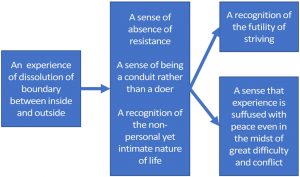Characteristics of the Oneness Experience in Experienced Meditators
By John M. de Castro, Ph.D.
“Imagine there is no past or future, only now. Imagine there is no space or time, just an unbounded eternity. Imagine endless peace, harmony, and unconditional love. Imagine no fear and equality in all things. This is Oneness.” – Roger Gabriel
Millions of people worldwide seek out transcendent experiences by engaging in practices, such as meditation, yoga, and prayer. Others use drugs such as peyote, mescaline, LSD, ayahuasca and psilocybin to induce these experiences. Transcendent experiences have many characteristics which are unique to the experiencer, their religious context, and their present situation. But, the common, central feature of transcendence is a sense of oneness, that all things are contained in a single thing, a sense of union with the universe and/or God and everything in existence. This includes a loss of the personal self. What they used to refer to as the self is experienced as just a part of an integrated whole. People who have had these experiences report feeling interconnected with everything else in a sense of oneness with all things. Although transcendent experiences can vary widely, they all contain this experience of oneness.
Unfortunately, there is very little systematic research on the oneness experience. In today’s Research News article “Understanding the Nature of Oneness Experience in Meditators Using Collective Intelligence Methods.” (See summary below or view the full text of the study at: https://www.frontiersin.org/articles/10.3389/fpsyg.2020.02092/full?utm_source=F-AAE&utm_medium=EMLF&utm_campaign=MRK_1437459_69_Psycho_20200922_arts_A ) Van Lente and colleagues recruited participants who had meditated for at least 5 years and who had experienced “oneness”. They met in groups on 5 occasions of about 3 hours each and discussed the nature of the “oneness” experience employing a structured technique called Interactive Management (IM).
The participants first individually generated ideas about the “oneness” experience. They then reviewed as a group the ideas generated and clarified and categorized the ideas. They then voted individually on the 5 best ideas of “oneness self-perceptions they believed most characterized their experience both during meditation and in their everyday experience in the world”. Finally, they investigated the relationships among the ideas regarding the “oneness” experience.
The participants generated 130 ideas about the “oneness” experience. These were analyzed and summarized into categories. From this analysis they concluded that “oneness” experiences involved perception, affect, cognition, motivation, action, and interpersonal relations. The most influential categories of oneness experience were unboundedness, identity–perception change, time–perception change, wholeness, and changes in action orientation.
Unboundedness referred to the perception that there were no boundaries between objects as they were seen as all together in a single entity. The idea of identity–perception change identified the self as also unbounded and not separate from everything else, but part of the whole. The idea of time–perception change was that there was only a timeless present moment. In the “oneness” experience there is no past or future, only now. The idea of wholeness involves seeing everything as part of a greater whole that is unbounded, integrated, and singular. Finally, the idea of changes in action orientation indicates a flow to experienced reality such that experiences flow seamlessly and all together. All of this led to the affective experience of total well-being.
These are interesting results produced by a structured process to determine the nature of “oneness” experiences that occurred in experienced meditators. In essence, in these experiences, they perceived a totality of experience occurring only in the present moment that involved everything integrated together, including the individuals themselves, and flowing seamlessly together. The ideas generated were very similar to ideas generated by individual anecdotes of “oneness” experiences or psychometric analysis.
It should be mentioned that the “oneness” experience is just that, an experience, and like all experiences cannot be adequately captured by words and concepts. The present analysis does the best it can at producing a conceptual analysis of the “oneness” experience. But inevitably it falls short of capturing the actual experiences of the individuals. In the literature on the “oneness” experience, it is referred to an ineffable, unable to be described adequately in words. To truly know the “oneness” experience it must be experienced.
“Oneness is an experience that transcends the mind. When we experience oneness, we feel a connection with everything in existence on every level. In other words, we feel ‘at one’ with all things.” – Mateo Sol
CMCS – Center for Mindfulness and Contemplative Studies
This and other Contemplative Studies posts are also available on Google+ https://plus.google.com/106784388191201299496/posts and on Twitter @MindfulResearch
Study Summary
Van Lente E and Hogan MJ (2020) Understanding the Nature of Oneness Experience in Meditators Using Collective Intelligence Methods. Front. Psychol. 11:2092. doi: 10.3389/fpsyg.2020.02092
Research on meditation and mindfulness practice has flourished in recent years. While much of this research has focused on well-being outcomes associated with mindfulness practice, less research has focused on how perception of self may change as a result of mindfulness practice, or whether these changes in self-perception may be mechanisms of mindfulness in action. This is somewhat surprising given that mindfulness derives from traditions often described as guiding people to realize and experience the non-separation of self from the world or its “oneness” with the whole of reality. The current study used a collective intelligence methodology, Interactive Management (IM), to explore the nature of oneness experiences. Five IM sessions were conducted with five separate groups of experienced meditators. Participants generated, clarified, and selected oneness self-perceptions they believed most characterized their experience both during meditation and in their everyday experience in the world. Each group also developed structural models describing how highly ranked aspects of oneness self-perceptions are interrelated in a system. Consistent themes and categories of oneness experience appeared across the five IM sessions, with changes in the sense of space (unboundedness), time, identity, wholeness, and flow highlighted as most influential. Results are discussed in light of emerging theory and research on oneness self-perception and non-dual awareness.
